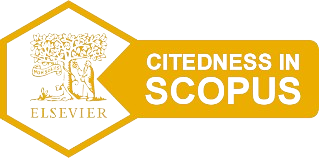The Implementation of Laptop Mobile in the Teaching-Learning Process in Islamic Boarding School
DOI:
https://doi.org/10.15408/tjems.v7i1.13650Keywords:
instructional technology, mobile laptop, instructional media, learning activities, Teknologi pembelajaran, laptop mobile, media pembelajaran, aktivitas belajarAbstract
Abstract
Computer literacy has become an interesting issue in the field of education as the integration of technology in education develops rapidly and continues to increase in the future. One aspect of computer literacy teacher’s and student’s perceptions and attitudes to use computers for classroom instruction. Unfortunately, this has been a challenge for incorporating technology during the teaching and learning process. The current study aims to analyze the implementation of the use of a mobile laptop in the class and unfold the student’s attitudes toward using laptops during their learning activities. This research was a survey study that includes interviews, observation and documentation as a data collection technique. The subject of the study is 312 students from seventh to ninth grade. Data analysis was done by the following steps: data collection, data reductions, data analysis, and conclusion making. The study finds that 1) course content and learning activities have been predetermined/ predesigned and stored in the laptops, 2) every student have access to the device with the help of group work. The study also reveals that the attitude of students toward the use of laptops in the classroom process is positive in the sense that they show satisfaction on the use of laptops. They also acknowledge the advantages of the computer for their learning and show high awareness of the importance of keeping the devices maintained and secured.
Abstrak
Salah satu bidang Tehnologi pembelajara adalah pemanfaatan teknologi informasi sebagai media pembelajaran. Hal tersebut selaras dengan perkembangan abad 4,0. Kemampuan siswa dalam menggunakan dan memanfaatkan computer (Komputer Literasi) menjadi isu yang menarik saat ini. Komputer literasi menjadi bagian dari teknologi pembelajaran. Tujuan dari penelitian ini untuk menganalisis implementasi penggunaan laptop Mobile dalam aktivitas belajar di kelas dan bagaimana respon siswa dalam penggunaan laptop Mobile di kelas. Penelitian ini dilakukan dengan survey. Sedangkan metode pengumpulan datanya dilakukan dengan cara wawancara, observasi, dan dokumentasi. Subjek penelitian ini adalah siswa kelas VII, VIII, dan VIII sejumlah 312 anak. Analisis penelitian ini dilakukan dengan cara mengumpulkan data, mereduksi, menganalisis, dan membuat kesimpulan. Hasil penelitian ini menunjukkan bahwa implementasi penggunaan laptop mobile dilakukan saat proses belajar mengajar dilakukan dengan cara 1) semua materi dimasukkan dalam laptop mobile, 2) semua siswa mendapatkan hak akses untuk menggunakannya, dan 3) aktivitas belajar sudah didesain dalam laptop mobile. Sedangkan respon siswa dalam menggunakan mobile laptop menunjukkan 1) tingkat kepuasaan dalam menggunakan laptop mobile, 2) tingkat kemanfaatan dalam menggunakan laptop mobile, dan 3) tingkat tanggungjawab dalam merawat laptop mobile pada angka rerata yang paling tinggi pada lilihan stuju dan sangat setuju.
How to Cite: Rusydiyah, E. F., Ummah, F. S., Mudlofir, A. (2020). The Implementation of Laptop Mobile in the Teaching-Learning Process in Islamic Boarding School. TARBIYA: Journal of Education in Muslim Society, 7 (1), 67-77. doi:10.15408/tjems.v7i1.13650.
References
Abdulhak, I., & Darmawan, D. (2015). Teknologi Pendidikan. PT. Remaja Rosdakarya.
Adamy, P., & Boulmetis, J. (2006). The impact of modeling technology integration on pre-service teachers’ technology confidence. Journal of Computing in Higher Education, 17(2), 100–120. https://doi.org/10.1007/BF03032700
Agustinova, D. E. (2015). Memahami Metode Penelitian Kualitatif Teori Dan Praktik. Calpulis.
Creswell, J. W. (2015). Penelitian Kualitatif Dan Desain Riset: Memilih Antara Lima Pendekatan. 3rd ed. Pustaka Pelajar.
Davis, F. D. (1989). Perceived usefulness, perceived ease of use, and user acceptance of information technology. MIS Quarterly: Management Information Systems, 13(3), 319–339. https://doi.org/10.2307/249008
Fauzan, U., & Pimada, L. H. (2018). ICT-Based Teaching of English at Madrasah Aliyah In Kalimantan. TARBIYA: Journal of Education in Muslim Society, 5(2), 193–211.
Ghavifekr, S., & Rosdy, W. A. W. (2015). Teaching and Learning with Technology: Effectiveness of ICT Integration in Schools. International Journal of Research in Education and Science, 1(2), 175. https://doi.org/10.21890/ijres.23596
Halili, S. H. (2019). Technological Advancements in Education 4.0. The Online Journal of Distance Education and E-Learning, 7(1), 63–69. www.tojdel.net
Han, I., Han, S., & Shin, W. S. (2019). Teachers’ and students’ perspectives on good teaching using technology in elementary classrooms. International Journal of Information and Communication Technology Education, 15(3), 103–116. https://doi.org/10.4018/IJICTE.2019070108
Kelvin Udim, D., & Akon Etim, E. (2016). Use of Multimedia in Teaching and Learning of Political Science in University of Uyo, Akwa Ibom State, Nigeria. Research in Pedagogy, 6(2), 154–170. https://doi.org/10.17810/2015.42
Kuhnel, M., Honal, A., Seiler, L., & Ifenthaler, D. (2018). Mobile Learning Analytics in Higher Education: Usability Testing and Evaluation of an App Prototype. Interactive Technology and Smart Education 15(1).
Li, L.-Y., & Lee, L.-Y. (2016). Computer Literacy and Online Learning Attitude toward GSOE Students in Distance Education Programs. Higher Education Studies, 6(3), 147. https://doi.org/10.5539/hes.v6n3p147
Montrieux, H., Vanderlinde, R., Schellens, T., & De Marez, L. (2015). Teaching and learning with mobile technology: A qualitative explorative study about the introduction of tablet devices in secondary education. PLoS ONE, 10(12). https://doi.org/10.1371/journal.pone.0144008
Mudlofir, A., & Rusyidah, E. F. (2016). Desain Pembelajaran Inovatif. Raja Grafindo Persada.
Munir. (2015). Multimedia Konsep Dan Aplikasi Dalam Pendidikan. Alfabeta.
Nasution, S. (2012). Teknologi Pendidikan. PT Bumi Aksara.
Ortega-Sánchez, D., & Gómez-Trigueros, I. M. (2019). Massive open online courses in the initial training of social science teachers: Experiences, methodological conceptions, and technological use for sustainable development. Sustainability (Switzerland), 11(3). https://doi.org/10.3390/su11030578
Rafique, H., Shamim, A., & Anwar, F. (2020). Investigating the Acceptance of Mobile Library Applications with an Extended Technology Acceptance Model (TAM). Computers and Education, 145, 103732. https://doi.org/10.1016/j.compedu.2019.103732
Republik Indonesia. (2007). Permendiknas No 16 Tahun 2007 tentang Standar Kualifikasi Akademik dan Kompetensi Guru.
Rusydiyah, E. F., Rakhmawati, R., Purwati, E., Hafiyusholeh, M., & Asyhar, A. H. (2019). Multimedia Application Development With Islamic Critical Reflection Through 3-2-1 Technique for Novice Teacher Internship Program. Advances in Science, Technology and Engineering Systems Journa, 4(3), 100–105. https://doi.org/10.25046/aj040314
Rusyidah, E. F. (2019). Teknologi Pembelajaran: Implementasi Pembelajaran Ea 4.0. Surabaya. UIN Sunan Ampel Surabaya Press.
Semerci, A. (2018). Students’ views on the use of tablet computers in education. World Journal on Educational Technology: Current Issues, 10(2), 104–114. https://doi.org/10.18844/wjet.v10i2.3420
Siyam, N. (2019). Factors impacting special education teachers’ acceptance and actual use of technology. Education and Information Technologies, 24(3), 2035–2057. https://doi.org/10.1007/s10639-018-09859-y
Soykan, E. (2016). Views of students’, teachers’ and parents’ on the tablet computer usage in education. Cypriot Journal of Educational Sciences, 10(3), 228–244. https://doi.org/10.18844/cjes.v1i1.68
Spanos, D., & Sofos, A. (2013). The views and attitudes of students participating in a one-to-one laptop initiative in Greece. Education and Information Technologies, 20(3). https://doi.org/10.1007/s10639-013-9299-z
Sutopo, A. H. (2013). Teknologi Informasi Dan Komunikasi Dalam Pendidikan. Graha Ilmu.
Trimmel, M., & Bachmann, J. (2004). Cognitive, social, motivational and health aspects of students in laptop classrooms. Journal of Computer Assisted Learning, 20(2), 151–158. https://doi.org/10.1111/j.1365-2729.2004.00076.x
Uno, H. B., & Lamatenggo, N. (2014). Teknologi Komunikasi Dan Informasi Pembelajaran. PT. Bumi Aksara.
Vasilache, S. (2016). Student Perspectives of Computer Literacy Education in an International Environment. Universal Journal of Educational Research, 4(6), 1426–1431. ttps://doi.org/10.13189/ujer.2016.040620
Yaumi, M. (2018). Media Dan Teknologi Pembelajaran. Kencana.











